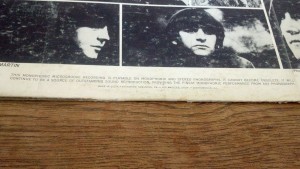I recently had the opportunity to pick through a pile of records (LPs for those of you who may be reading this and thinking I mean record as the term is applied in archival practice) and take what I wanted. One of the records I brought back to my apartment was the Beatles classic “Rubber Soul.” I returned home to my apartment, eager to place the vinyl disc into my record player and listen to John, Paul, George, and Ringo lay it down. However, I forgot that I was an Information nerd and that I would be able to just listen to the music. Reading the back side of the album cover, I noticed a fascinating passage below the track list and glamour shots of the boys.

“This monophonic microgroove recording is playable on monophonic and stereo phonographs. It cannot become obsolete. It will continue to be a source of outstanding sound reproduction, providing the finest monophonic performance from any phonograph.”
As you can see in the image to the left, the text reads “This monophonic microgroove recording is playable on monophonic and stereo phonographs. It cannot become obsolete. It will continue to be a source of outstanding sound reproduction, providing the finest monophonic performance from any phonograph.” I was struck by the boldness of these claims, and the explanation of the technical achievements underlying the record. Never become obsolete? What hubris, Capitol Records! I suppose that the disc is still playable on the equipment I have, 50 years or so after it was pressed, meaning that the author of this claim is somewhat vindicated. But it still strikes me as a fascinating example of how limited our perspective can be when it comes to information technology and the permanence of different media. When “Rubber Soul” was released in 1965, computers were just becoming affordable for factories and scientific labs. The Apple I was still more than 10 years from existence. And yet, someone thought it was reasonable to claim that a Beatles record would never become obsolete.
What did they think would come after stereophonic playback? Triphonic? Quadrophonic? The Who didn’t even release Quadrophenia until 1973! Better yet, what claims do we make about our media storage and playback now that will be considered this ridiculous in 50 years? Who remembers ZIP drives? 3.5in floppy disks? Even the spinning hard drive is slowly being replaced in consumer-level computers. I don’t have the ability to see into the future and predict how we’ll store and access music, but I’m sure that people then will consider our attempts to preserve media as short-sighted as I view the claims on the back of “Rubber Soul.”